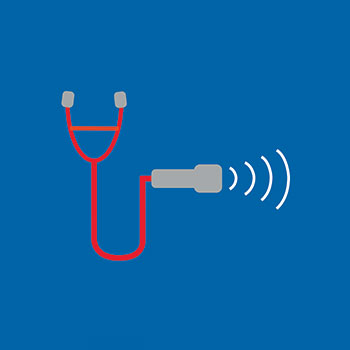Latest updates on ACP's priorities, initiatives
ACP Spotlight offers readers a look at ACP's current top priorities and initiatives, as well as highlights from our e-newsletter, ACP Internist Weekly.
ACP joins internal medicine organizations in awarding grants to support DEI
ACP, the Alliance for Academic Internal Medicine, the American Board of Internal Medicine (ABIM), the ABIM Foundation, the Josiah Macy Jr. Foundation, and the Gordon and Betty Moore Foundation awarded a total of $470,000 in grants to 20 projects at medical schools and teaching hospitals across the U.S.
Grants range from $10,000 to $40,000, depending on the scope of the program, and will support interprofessional projects that are led by internal medicine residents, fellows, and faculty focused on improving trust and advancing health equity. Several grants will also address diagnostic gaps that exacerbate inequity.
Live, in-person POCUS courses to be held next month in Nashville

The Foundational Skills for Internists Course will be held on Nov. 10-11, and the Advanced Skills for Outpatient Practice Course will take place on Nov. 12. Participants will earn CME/MOC upon course completion. Interested participants must register online.
New learning series addresses impact of health equity on diagnostic decision making
“Understanding and Addressing Disparities in Diagnosis Learning Series” offers evidence-based strategies for improving diagnostic decision making by mitigating the effects of unconscious bias. The series consists of three free modules, with free CME/MOC credit for ACP members, and is funded by the Gordon and Betty Moore Foundation through a grant program administered by the Council of Medical Specialty Societies.
ACP position paper addresses ethical issues in determining death
ACP believes physicians should advocate for policies and practices on the determination of death that are consistent with the medical profession's fundamental commitment to individual patients and to the public. The College supports:
- revising the Uniform Determination of Death Act (UDDA) to replace the word “irreversible” with “permanent” in clarifying the permanent cessation of circulatory and respiratory functions, but retaining the word irreversible in describing brain death;
- maintaining circulatory and whole brain (neurologic) standards for determining death as separate, independent standards, consistent with current medical practice and with respect for established standards as well as for those cultures and religious traditions that accept only the circulatory determination of death;
- retaining the whole brain standard for determining death according to neurologic criteria and opposing “higher brain” function standards;
- aligning medical tests used for determining death with legal standards, not the other way around, asserting that medical criteria or tests should not be specified in the UDDA as they do not define death but rather, indicate whether death has occurred;
- acknowledging that determination of death is a distinct issue from organ transplantation and that the criteria for determining death should not be governed by the need to procure organs for transplantation; and
- calling for additional education for physicians, other clinicians, and the public about how death is determined and improving communication about the determination of death and dying process.
The paper was developed by ACP's Ethics, Professionalism and Human Rights Committee and was published Sept. 5 by Annals of Internal Medicine.
ICYMI: Highlights from ACP Internist Weekly
Telehealth visits may improve outcomes for opioid use disorder. A cross-sectional study of U.S. insurance claims found that buprenorphine initiation during a telehealth visit was associated with a 36% lower overdose rate than in person and that patients in the former group were more likely to refill their prescriptions. The study was published Sept. 5 by the Journal of General Internal Medicine and summarized in the Sept. 12 ACP Internist Weekly.
‘Night owls' more likely to have unhealthy lifestyles, higher diabetes risk. A retrospective cohort study found that people with an evening chronotype versus a morning chronotype were more likely to smoke, sleep poorly, and be physically inactive and had a 72% higher risk for diabetes. An accompanying editorial noted that circadian misalignment of chronotype and work shifts, rather than the chronotype alone, may also have an effect. The study and editorial were published Sept. 12 by Annals of Internal Medicine and summarized in the Sept. 12 ACP Internist Weekly.



